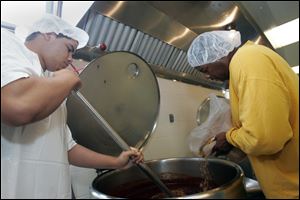
EMPLOYMENT STUDY
Start-up businesses generating fewer jobs
7/12/2011
Pierce Baker, 18, stirs sauce as his father, Kyle Baker, adds more ingredients for the startup business Gertie's Premium BBQ Sauce, owned by Kyle Baker and sibling Viveca Crews, both of Toledo, in this 2010 file photo.
WASHINGTON -- New U.S. businesses are starting leaner and with fewer employees than was the case in the past, an independent study showed Monday, suggesting that the pace of job creation will remain frustratingly slow.
The study by the Kauffman Foundation found that this trend was entrenched well before the 2007-09 recession, which destroyed more than 8 million jobs.
Start-ups are key to long-term employment growth. The study drew on data on new establishments from the Bureau of Labor Statistics and the Census Bureau to paint a bleak picture of an economy struggling to generate jobs to absorb the 14.1 million unemployed Americans.
Job growth has stalled in recent months, with employers adding a scant 18,000 workers to payrolls in June and the unemployment rate climbing to 9.2 percent from 9.1 percent in May. Nonfarm employment rose 25,000 in May.
"One of the major problems that we have is that businesses have been starting smaller and growing less for the last several years," said E.J. Reedy, a Kauffman research fellow and co-author of the study.
Before the recession, 45 to 50 percent of start-ups survived. Now the survival rate is below 45 percent.
The study found that firms begun in 2009 were on pace to create a million fewer jobs in the next decade than historical averages.
Historically, new U.S. firms generate about 3 million new jobs yearly, but in 2009 they created just 2.3 million.
The study's analysis of Census Bureau data found the number of new employer businesses had dropped 27 percent since 2006.
Although the level of start-ups has held steady or edged up since the recession, when including new employer businesses and newly self-employed workers, it said they did not grow enough to generate the jobs needed to support overall economic growth.
The analysis of Bureau of Labor Statistics data shows employment at new businesses dropped from a peak of 4.7 million jobs annually between 1997 and 2000 to fewer than 2.5 million in 2010. At the firm level, the decline is more dramatic. New businesses opened with about 7.5 jobs on average for much of the 1990s, but that is now at 4.9 jobs.
Similar findings are deduced from Census Bureau data.